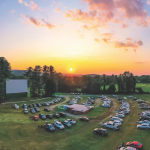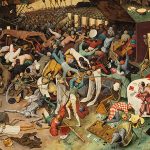
You’ve already seen music venues being turned into more than performance spaces. What once was the merch table is morphing into pop-up stores for national brands, and if you’re in the right venue, Uber Eats can get a gourmet burger to you a few hours before the same driver is waiting outside to pick you up after the show. But there’s another kind of space that might start showing up at shows here this year and into the future: safe spaces.
At 22, Scottish singer-songwriter Lewis Capaldi makes Ed Sheeran look a bit long in the tooth, and he’s already had a string of hits — his single “Someone You Loved” was number one for seven weeks this spring — in the U.K. and beyond. But he also has had a few panic attacks, including of the sort we once called stage fright which, during one performance, caused him to leave the stage early.
It’s easy to scoff at Gen X and Z’s many mental maladies, from gender and racial identity confusion to a range of “triggers” that require content warnings before a book is opened, a movie watched or a conversation started. But they’ve also put plenty of legitimate concerns on the table, ones that really needed to be there, such as the ubiquity of PTSD, a condition now disturbingly shared by both troops deployed in Afghanistan and high-school students. And whatever your opinion is on some of what is being put on the front burner in terms of contemporary psychoses, it’s worth at least becoming more aware of it, because it’s moving into the live venue, brought in by a generation of concertgoers and artists, and ultimately, us.
The LiveLive Space
So within that context, it’s not so surprising that Capaldi has announced that he’s providing safe spaces at his concerts this year, available to fans who feel at risk of a panic or anxiety attack while at the show, and funded by a very small (approximately 65 cents) mandatory surcharge on his ticket, to cover the costs of an arrangement he and his management have dubbed LiveLive. Via an app or a text, fans will be able to access support from a qualified mental-health team at each venue before and during Capaldi’s 2020 arena shows. There will also be designated help points for anyone struggling emotionally, an “escape room” for anyone who needs time out, and a “gig-buddy” system for fans traveling alone. Capaldi has also established an email address where fans can contact a qualified support provider to discuss any concerns in advance of one of his concerts, and arrange to be accompanied into the venue, if they want. They’ve also partnered with a Minnesota-based company (Music & You) that applies mindfulness techniques to overcome panic and anxiety sensations.
Not Surprising
This was perhaps inevitable: In the wake of terrorist attacks and other disasters at music performances and venues, in the U.S., the U.K., France and elsewhere, for many people the very idea of going to a stadium or arena concert, or to any space where lots of people they don’t know gather, is terrifying. And aside from the personal emotional toll this kind of fear takes on individuals, it also has the potential to negatively impact the economics of live music. Streaming recorded music has almost brought the music business back to its pre-Napster revenue levels. UMG’s labels are now earning nearly $10 million a day from Spotify, Apple Music, Amazon Music and YouTube — and it won’t take that much for more people to decide they’d rather listen at home a few nights instead of buying tickets. (Sorry to be so bluntly transactional, but this is a business column.)
There have been a few tentative efforts to address agoraphobia in the concert hall in the past. For instance, in 2016, London’s Roundhouse venue started offering what they called ”visual stories” on its website, where potential visitors could view photographs and descriptions of the different spaces within the venue. The thinking is that if you know what you’re walking into, you’re less likely to be fearful of a strange environment.
However, LiveLive is thought to be the first such initiative on a tour of this scale. Capaldi told the BBC: “I think with a little bit of success, we could make it a more widespread thing, to be able to offer this to everyone at all gigs.” And given the hypersensitized nature of the concert going cohort in the U.S., Capaldi’s initiative is likely to find some traction here. Halsey has put the idea out there, though to her the entire venue is the safe place for LGBTQers; Harry Styles has made similar assertions. And in music as in magic, sometimes wishes can be horses. Simply declaring a space safe may be sufficient when it’s the star that makes the declaration. At least for the moment. LiveLive seems to be trying to make that assertion considerably more formal.
I’m Talking To You…
While we’re at it, it’s worth pointing out that anxiety and generalized fearfulness aren’t limited to musicians and their fans. Want something big to worry about? How about being the one person who stands between a great music experience for thousands of people who shelled out hundreds of dollars each, and a musical disaster. Yeah, you. That’s a lot of pressure night after night. There is a growing number of mental-health resources that musicians can turn to, like Music Minds Matter, a support line and service for the U.K. music community. There are far fewer resources that target the audio technology professional; two of them are the Music Health Alliance, which focuses on healthcare services with an emphasis on preventing illness and staying well, and the Recording Academy’s charity MusiCares, which provides a safety net of critical assistance for music professionals in times of need, including financial, medical, and personal emergencies.
Those who make the shows happen may have to dig a little harder to find help, but it’s out there. What Lewis Capaldi is doing is helping bring some of those resources a lot closer to the source. He could have just partnered with Budweiser and Apple like everyone else; instead, he did the right thing. And for that, he deserves some kind of award.



